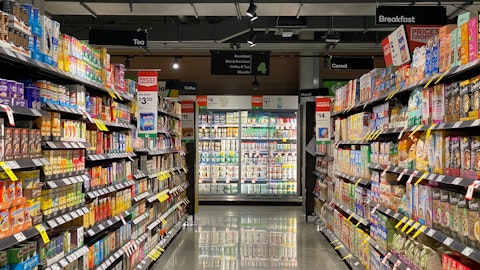Corey Tarlowe: Great. Thanks. I was wondering if you talk a little bit about your price gaps relative to the competition? So in recent months, I think, some of your competitors have gotten a little bit more aggressive on pricing. Have you noticed as a result and a need to adjust your prices accordingly, and if so, how do those price gaps compared to what they have been in the past?
RJ Sheedy: The price gaps are very healthy. We always are managing value. We look at it a lot of different ways and that’s both for everyday pricing and promotional pricing. We have seen a little bit of a tick up in promotional activities. Nothing that concerns us. We have been at this business for a long time in all types of promotional environments and our value continues to show a really nice spread and it’s the reason why we have seen such healthy growth this year. We maintain the basket savings, and the target there is 40% relative to conventional grocers. That puts us at around a 20% basket savings to the big discounters in our markets. And at a time like this, when inflation is really high for food and then for everything else, consumers are finding us as the place that offers the best value and access to affordable food compared to anyone else out there.
So we will continue to keep a close eye on that. As the promotional environment changes, we will adjust accordingly. No concerns with a slight increase there and feeling really good about the value that we are delivering to customers and the trends that it’s driving.
Corey Tarlowe: Great. Thank you very much. Best of luck.
RJ Sheedy: Thank you.
Operator: The next question comes from Michael Baker with D.A. Davidson. Please proceed.
Michael Baker: Okay. Thanks. I am curious about the, what would your comp guidance have been with, so I guess your comp guidance would have been 500 basis points or 300 basis points better without this, I am sorry, it would have been about 5%. So still a little bit of a slowdown from what you would have been at about 8% without this issue. Why the slowdown? Is that just sort of being conservative? You guys always seem to guide conservatively or is there another reason why even adjusting the systems issue back, the comps would slow?
Charles Bracher: Yeah. Mike, I think, when you do the math and look at some of the stack comps, you would see once you adjust for the system impact, you are going to see pretty steady performance as it relates to the guide and so it really is more of a reflection of just lapping higher numbers from prior year, both with respect to increases in traffic that we were driving last year, as well as just higher inflation levels impacting the basket.
Michael Baker: Okay. That makes sense. And if I could ask sort of a follow-up, I guess, to that. The — it seemed like, correct me if I am wrong, but we sort of backed into your guidance — back of the second quarter, you gave back half guidance and then you gave some color on the third quarter. So you could back into the fourth quarter and it seemed like you were planning on something close to about 2, 2.5 and that was before the systems issue. Now if you back out the systems issue, it seems like you are planning out something closer to 5. So, I guess, my question is without the systems issue, would your fourth quarter outlook have been better than it was previously? In other words, is the underlying business actually even better than you had thought, excluding the systems issue?
Charles Bracher: Yeah. Again, just to clarify there, Mike. So we have not previously commented on fourth quarter comps. Again, we provide kind of a range for the full year and the current quarter commentary, if you will. So I can’t reconcile the numbers you are speaking to other than to say for us, again, as you normalize for the system transition impact, we are feeling really good about the underlying health of the business as it relates to comp and particularly the traffic that we are driving into the stores as customers are really responding to the values we are offering and everyone continues, while inflation is moderating, absolute prices remain really high, and so consumers are seeking us out.


